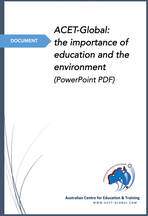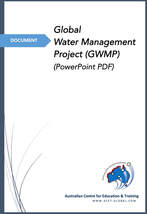
The Global Water Management Project (GWMP) aims to increase our awareness of the importance of this vital resource, and provide tools for individuals to make more water-conscious choices in everyday life. Too often, and particularly in more developed countries, water is taken for granted and water management decisions can lack foresight. By working together, it's possible to change our relationship with this key resource, so we can improve water management throughout the world and work towards sustainable and equitable access to safe, clean water for everyone.
With the information available here, you can take action today to help protect and maintain our water resources by decreasing your water usage, and also by helping improve water quality. If everyone does just a little bit, we can work towards sustainable management and equitable long-term access to safe water resources for people everywhere, as well as for all the other species that share our planet.
This project ties in with many of the United Nations' Sustainable Development Goals (SDGs). In particular, it is relevant to SDG #1: End poverty in all its forms everywhere, SDG# 2: Zero hunger, SDG #6: Ensure access to water and sanitation for all, and SDG #15: Sustainably manage forests, combat desertification, halt and reverse land degradation, halt biodiversity loss.
Water is critical. In addition to its most important function of enabling organisms to live and survive, water is a key driver of economic and social development, while it also has a basic function in maintaining the integrity of the natural environment.
Water management is a broad and complex umbrella term that covers areas including drinking water supplies, extreme weather events (including floods), water and wastewater treatment, water scarcity and diminishing freshwater supplies, water allocation, water recycling, non-conventional water resources, conflict over water resources, differences in availability of water, water pollution, and other elements, such as urbanisation and industrial expansion.
Humans are placing unprecedented pressure on water resources. Water scarcity is a growing problem throughout the world. Already, it affects more than 40% of the global population. With climate change and demographic changes compounding water scarcity issues, it's important that we equip ourselves now to face increased water limitations and scarcity in the near future.
To allow human survival, it is crucial that we manage the world's water and related resources in a sustainable, efficient, and equitable manner - without compromising the health of our natural ecosystems. Water security is already a major - and often growing - challenge facing many countries. Estimates show that with current practices, the human world will face a 40% shortfall between forecast demand and available supply of water by 2030. We need to take action now.
You can help actively address global water management issues using the resources provided here – there are lots of easy behavioural changes that often save money too! Education around efficient and conscious use of water can drive collective change – and simple behavioural changes can have huge positive impacts. The GWMP also links closely with the Global Sanitation and Sustainability Project (GSSP), which aims to minimise water usage in sanitation. You can check out the GSSP here.
As citizens of the world, it's our responsibility to be aware of the value of water, and to truly appreciate this life-giving resource. It's vital that we don't exploit our precious water resources, but that we work together to manage them sustainably into the future. Not only for the sake of us and our future generations, but to maintain the well-being of the natural environment and the other species that call Earth home. Together, we can look at solutions and work towards more appropriate and responsible use of water, regardless of our geographic location. Remember that lots of little actions add up to create significant change - the same way that many single drops of water create the oceans.
With the information available here, you can take action today to help protect and maintain our water resources by decreasing your water usage, and also by helping improve water quality. If everyone does just a little bit, we can work towards sustainable management and equitable long-term access to safe water resources for people everywhere, as well as for all the other species that share our planet.
This project ties in with many of the United Nations' Sustainable Development Goals (SDGs). In particular, it is relevant to SDG #1: End poverty in all its forms everywhere, SDG# 2: Zero hunger, SDG #6: Ensure access to water and sanitation for all, and SDG #15: Sustainably manage forests, combat desertification, halt and reverse land degradation, halt biodiversity loss.
Water is critical. In addition to its most important function of enabling organisms to live and survive, water is a key driver of economic and social development, while it also has a basic function in maintaining the integrity of the natural environment.
Water management is a broad and complex umbrella term that covers areas including drinking water supplies, extreme weather events (including floods), water and wastewater treatment, water scarcity and diminishing freshwater supplies, water allocation, water recycling, non-conventional water resources, conflict over water resources, differences in availability of water, water pollution, and other elements, such as urbanisation and industrial expansion.
Humans are placing unprecedented pressure on water resources. Water scarcity is a growing problem throughout the world. Already, it affects more than 40% of the global population. With climate change and demographic changes compounding water scarcity issues, it's important that we equip ourselves now to face increased water limitations and scarcity in the near future.
To allow human survival, it is crucial that we manage the world's water and related resources in a sustainable, efficient, and equitable manner - without compromising the health of our natural ecosystems. Water security is already a major - and often growing - challenge facing many countries. Estimates show that with current practices, the human world will face a 40% shortfall between forecast demand and available supply of water by 2030. We need to take action now.
You can help actively address global water management issues using the resources provided here – there are lots of easy behavioural changes that often save money too! Education around efficient and conscious use of water can drive collective change – and simple behavioural changes can have huge positive impacts. The GWMP also links closely with the Global Sanitation and Sustainability Project (GSSP), which aims to minimise water usage in sanitation. You can check out the GSSP here.
As citizens of the world, it's our responsibility to be aware of the value of water, and to truly appreciate this life-giving resource. It's vital that we don't exploit our precious water resources, but that we work together to manage them sustainably into the future. Not only for the sake of us and our future generations, but to maintain the well-being of the natural environment and the other species that call Earth home. Together, we can look at solutions and work towards more appropriate and responsible use of water, regardless of our geographic location. Remember that lots of little actions add up to create significant change - the same way that many single drops of water create the oceans.
Related Resources (Documents):
Please left-click the document image below to open.
Please left-click the document image below to open.
Related Resources (Video Links):
For an overview of ACET-Global's Global Water Management Project, left-click our video below.
|
|
|
For additional, interesting information on water management, we recommend watching the following TED talks. TED is a global non-profit community dedicated to sharing free knowledge and spreading important ideas with the power to change lives for the better. These talks are linked here with the kind permission of TED.
Please left-click the links below to open the videos.
Please left-click the links below to open the videos.


